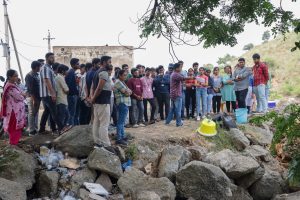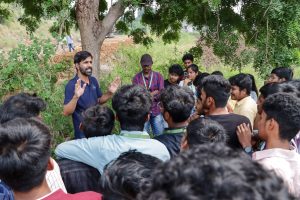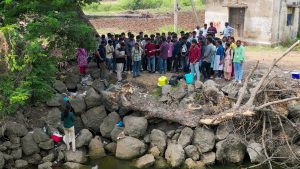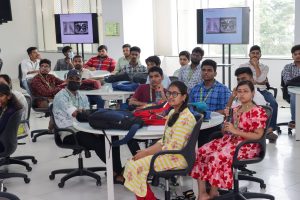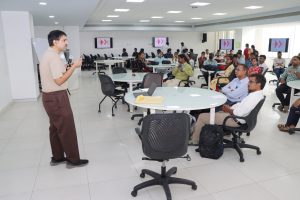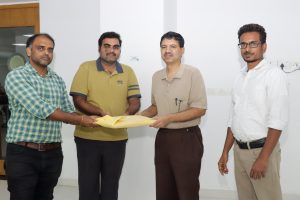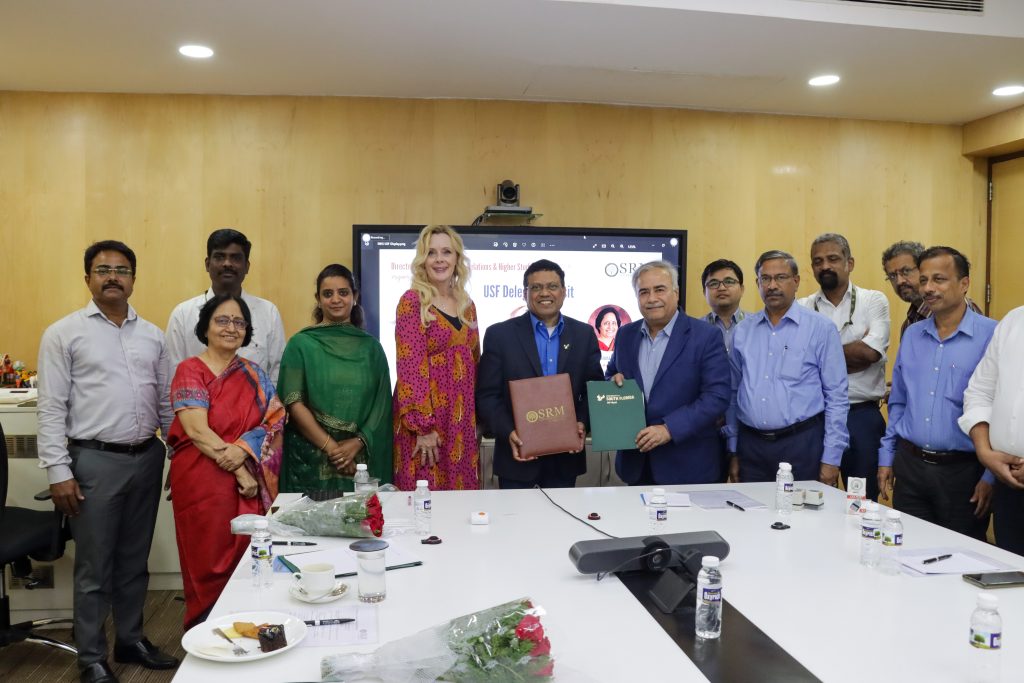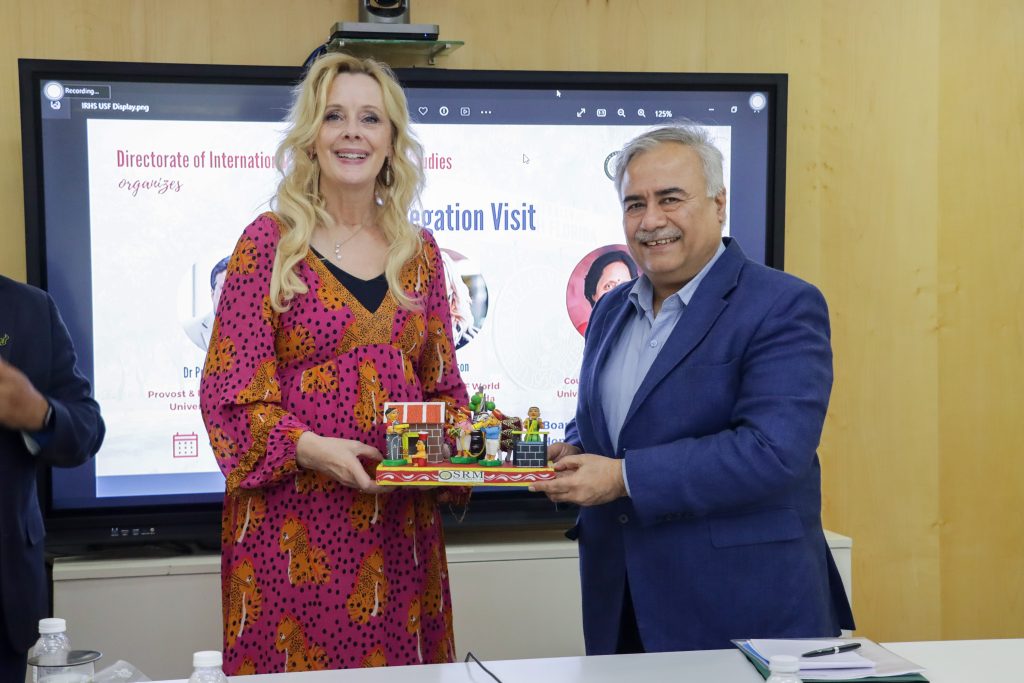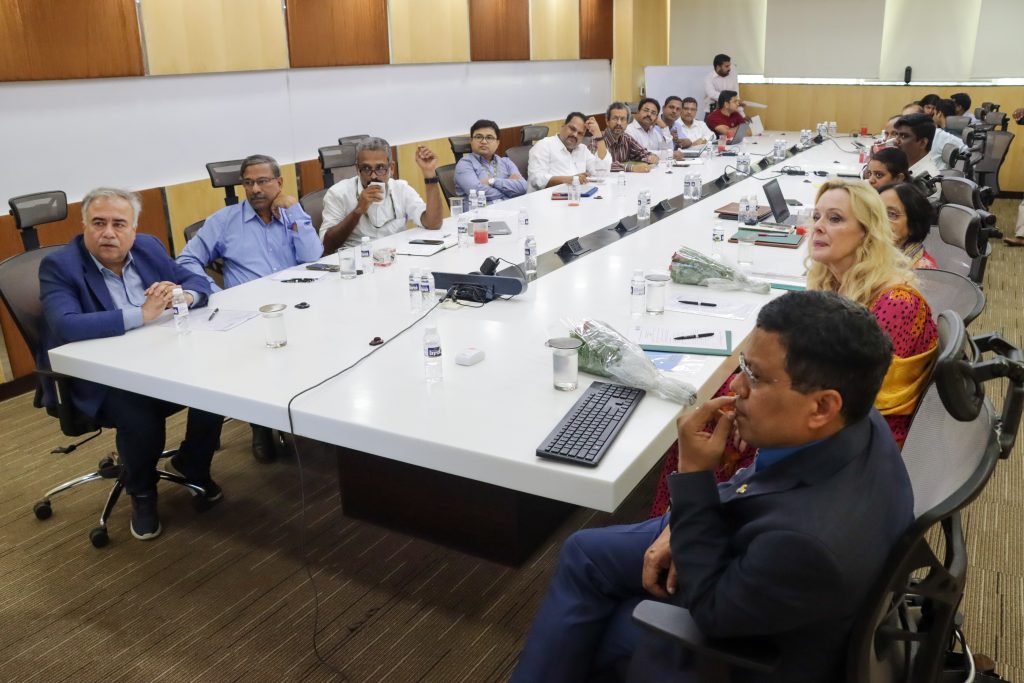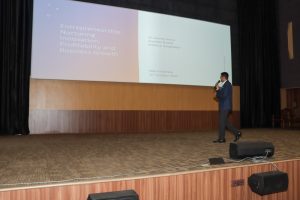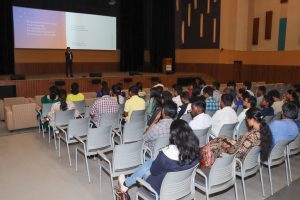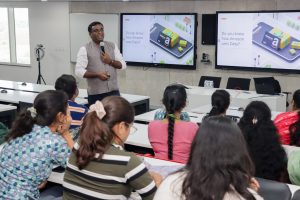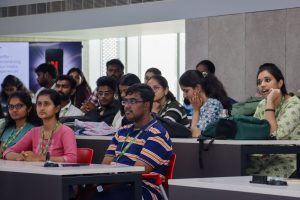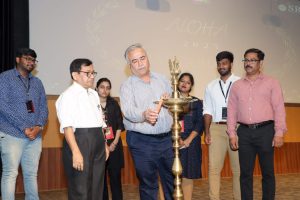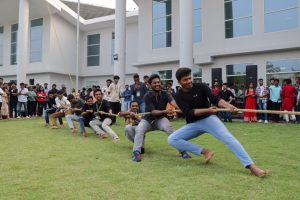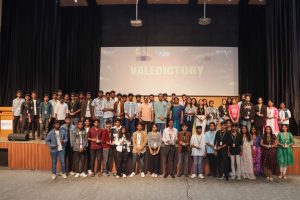Field Visit for Environmental Awareness
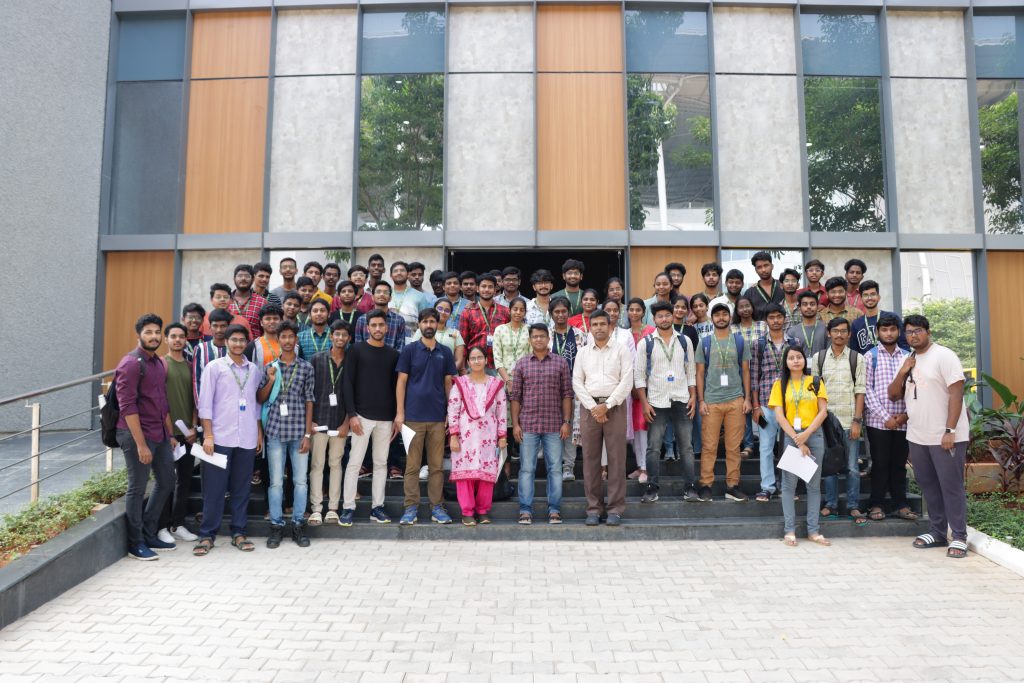
The Department of Environmental Science and Engineering organised a field visit for first-year odd semester students as a part of their Environmental Science course (VAC-101) from October 16-20, 2023 around the vicinity of SRM University-AP campus. The students were made aware of the surrounding land-uses, their biodiversity, impacts and importance to the environment. Observations were made on different threats like pollution, plant invasion, fertilizer run-off, etc. and the students were explained what can be done as an individual and as a community to protect our resources. Practical know-hows on vegetation and water sampling were also demonstrated by different faculty members. The students returned with a heightened sense of stewardship towards environmental protection.
- Published in Departmental News, ENVS News, News
Prof. Naik Expounds on the Future of Biomedical Imaging
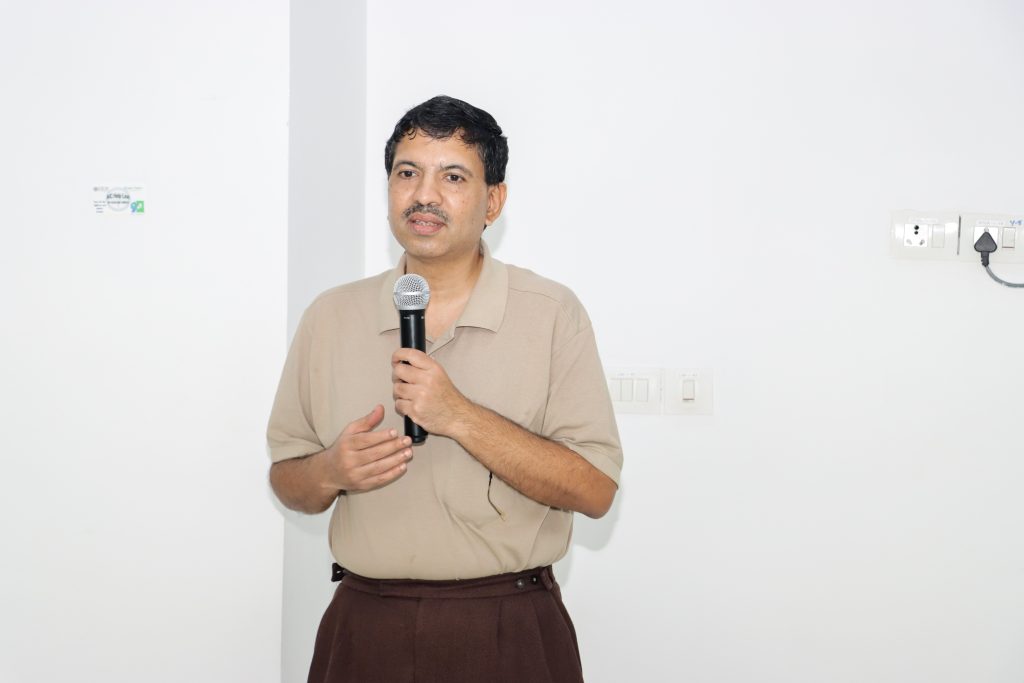
The Department of Electronics and Communication Engineering hosted an Invited Talk on “Dynamic Shape-based Biomedical Tomographic Reconstruction Algorithms” by Prof. Naren Naik, IIT Kanpur on October 30, 2023. Prof. Naren Naik, a well-acclaimed researcher and specialist in tomography reconstruction algorithms discussed extensively on tomographic problem definition and formulation, shape reconstructions, shape-tomography based on radial basis functions (RBF), and the diagnosis of early-stage cancer using tomography. He also explored replacing nuclear medicine modalities with optical fluorescence methods, especially in applications like early cancer detection and metabolic imaging. Additionally, the presentation delved into nonlinear-reconstruction frameworks for fluorescence optical tomography.
Faculty, Research scholars and BTech students from various departments participated in this insightful session. The event was organised by Assistant Professor, Dr V Sateeshkrishna Dhuli of the Department of Electronics and Communication Engineering, SRM University-AP.
- Published in Departmental News, ECE NEWS, News
SRM University-AP Signed MOU with University of South Florida
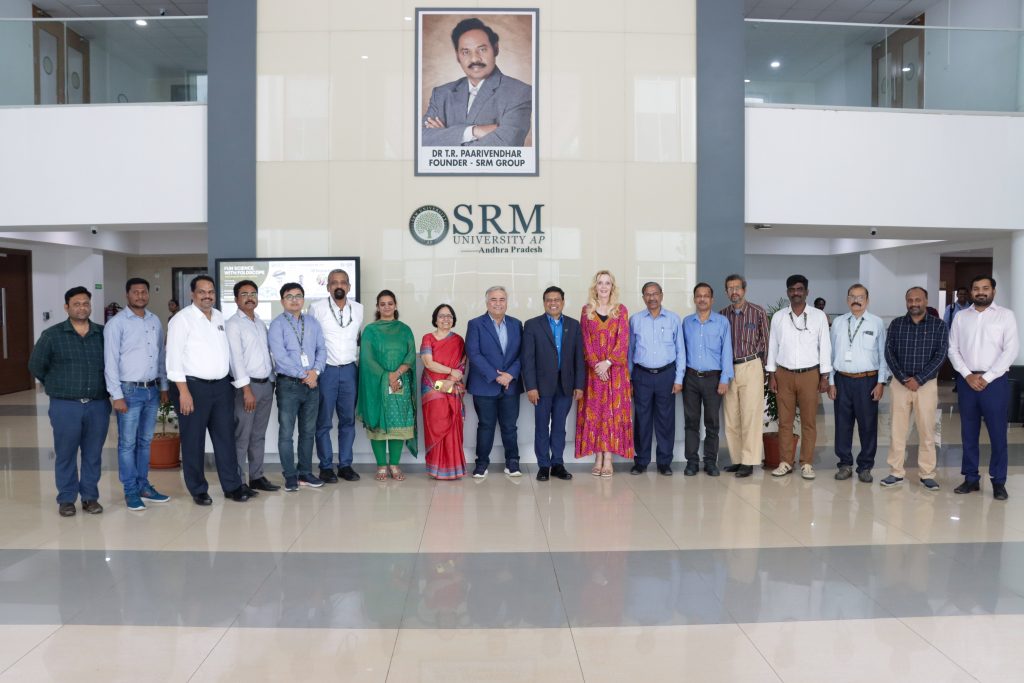
SRM University-AP, Andhra Pradesh, takes a momentous step towards enhancing its global presence and fostering academic collaboration by signing a Memorandum of Understanding (MOU) with the University of South Florida (USF). This historic event took place in the esteemed presence of Prof. Manoj K Arora, Vice Chancellor, SRM University-AP, Dr Prashant Mohapatra, Provost & Executive Vice President of the University of South Florida, along with Dr Kiki Caruson, Vice President, USF.
The MOU hailed as an “umbrella agreement” represents a comprehensive and strategic partnership to promote collaborative research, student exchanges, faculty interactions, and cultural engagement between the two institutions. This MOU will pave the way for academic exchanges, joint research initiatives, and collaborative projects that will enrich the educational experience for students and faculty at both institutions. The partnership seeks to facilitate cultural exchanges, allowing students to gain a broader understanding of global perspectives and fostering an atmosphere of inclusivity and diversity. SRM University-AP students will have the opportunity to experience a truly global education by participating in programs and activities hosted by the University of South Florida. Joint research projects will allow both institutions to tackle complex global challenges and significantly contribute to their respective academic fields.
Dr Prashant Mohapatra emphasised the importance of international collaborations in higher education, stating, “This partnership allows us to combine our strengths and resources for the benefit of our students and faculty. We look forward to the notable opportunities that lie ahead and remark on the potential for impactful research collaborations; by bringing together our expertise and knowledge, we can address global challenges more effectively. This MOU is a testament to our shared commitment to academic excellence.”
Prof. Arora, also expressed his enthusiasm for the collaboration, saying, “This MOU signifies the beginning of a new era in our journey towards global academic excellence. We are thrilled to join hands with the USF, a renowned institution with a strong commitment to innovation and research.” As the academic world evolves, SRM University-AP remains dedicated to providing its students with the best possible opportunities and experiences. The MOU with the University of South Florida is a significant stride in this direction, reinforcing the institution’s commitment to global learning and a brighter future.
Dr Gaurav Arora on the Power of Entrepreneurship
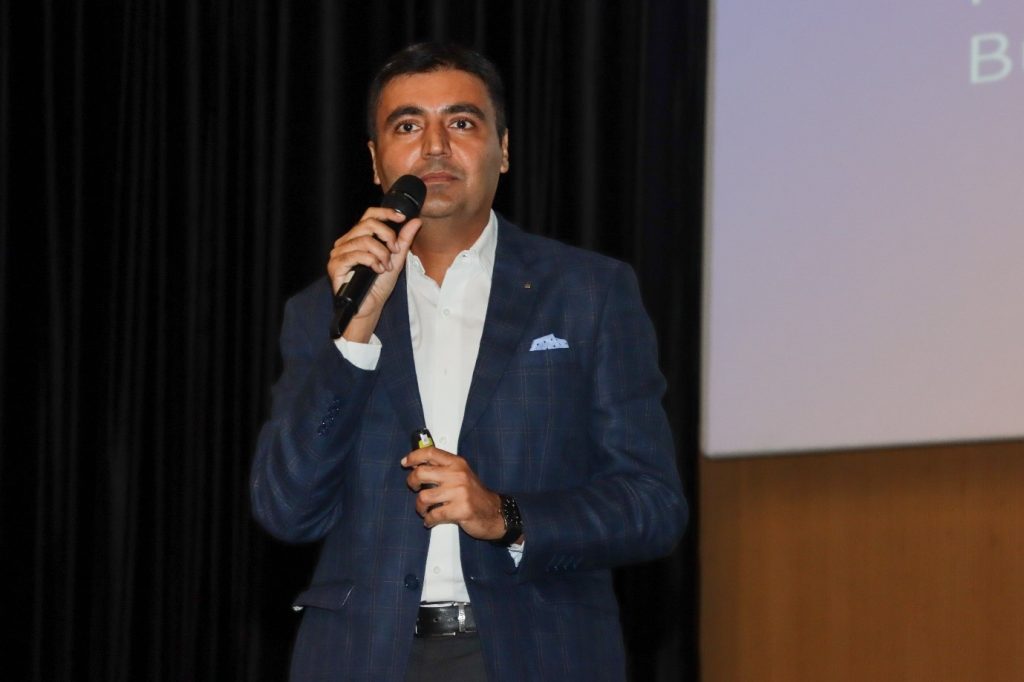
Paari School of Business is committed to nurturing the entrepreneurial spirit among its students. The school had invited Dr Gaurav Arora, Global Entrepreneur at Enhance (Luxury Hospitality and Tourism Representation), to deliver an inspiring lecture on October 11, 2023. The lecture titled “Entrepreneurship: Nurturing Innovation, Profitability, and Business Growth” encapsulated key insights for budding entrepreneurs.
Dr Arora dispelled the notion that entrepreneurship is an exclusive venture, asserting that anyone can dare to dream and embark on this journey. He highlighted the importance of enthusiasm, initiative, and teamwork in entrepreneurial success. The lecture showcased the power of keywords such as passion, motivation, and reliability, which serve as the foundation for a successful entrepreneurial career.
He shared valuable experiences in navigating challenges, including the digital transformation his company undertook during the COVID-19 pandemic. Dr Arora emphasised self-reliance and the significance of taking initiative to achieve one’s goals. The lecture concluded with a simple yet effective approach to success: Dream, Plan, and Execute. Dr Arora also shared an inspiring success story, “Zerodha” India’s leading stockbroker.
The lecture provided a wealth of insights, encouraging students to embrace creativity, take calculated risks, and maintain a clear vision for their entrepreneurial endeavours.
- Published in Departmental News, News, Paari Current Happenings
Kanchan Khera Deliberates on the Secrets to Successful Entrepreneurship
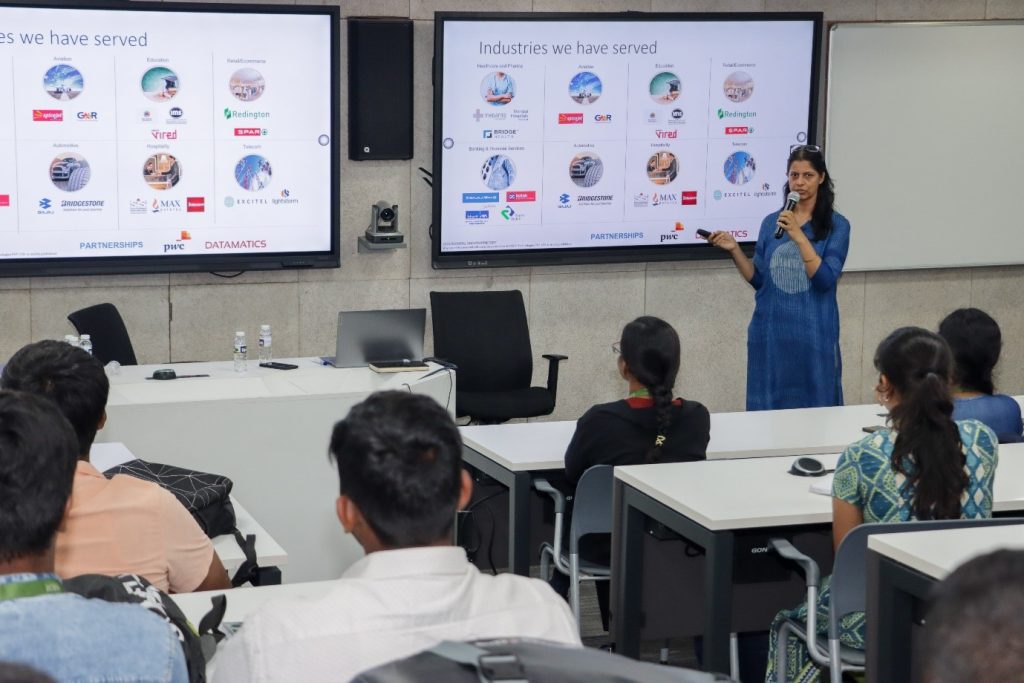
Ms Kanchan Khera, the CEO and founder of Zykrr, a cutting-edge technology company that is transforming experience management, discussed the role of entrepreneurship in the contemporary business environment and revealed the secrets of becoming a successful entrepreneur. The Paari School of Business organised a guest talk by Ms Kanchan Khera on September 26, 2023, to enlighten the students on the path to successful entrepreneurship.
- Published in Departmental News, News, Paari Current Happenings
The Significance and Impact of AI-powered Marketing
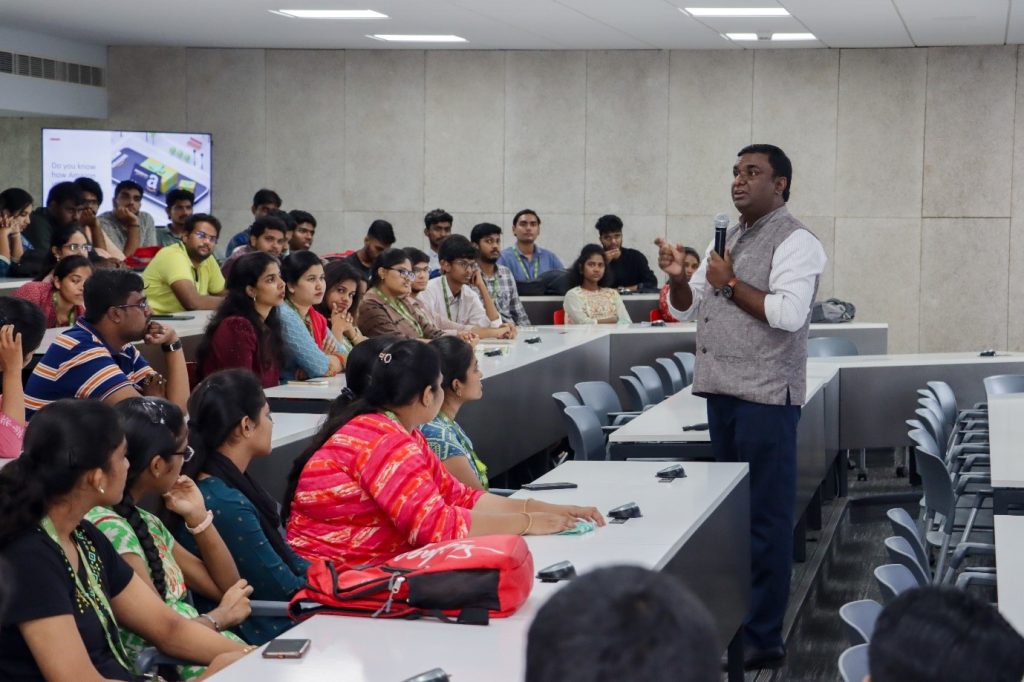
With the advent of AI, the business sector gradually transitions to tech-dominated management and marketing practices for increased impact. On this note, the Paari School of Business organised a guest lecture on “AI and Generative AI-Powered Marketing” on September 26, 2023, by Mr Laxminarayanan G, Senior Vice President and Global Delivery Head of Polestar Solutions. Mr Laxminarayanan emphasised that AI is the latest trend in the world, and companies such as Amazon, Google, Uber, and Swiggy/Zomato are using it effectively to improve the customer experience by exploring the significance and impact of AI-powered marketing on the business management.
- Published in Departmental News, News, Paari Current Happenings
IIT Bombay Professor Delivers Distinguished Lecture at SRM University-AP
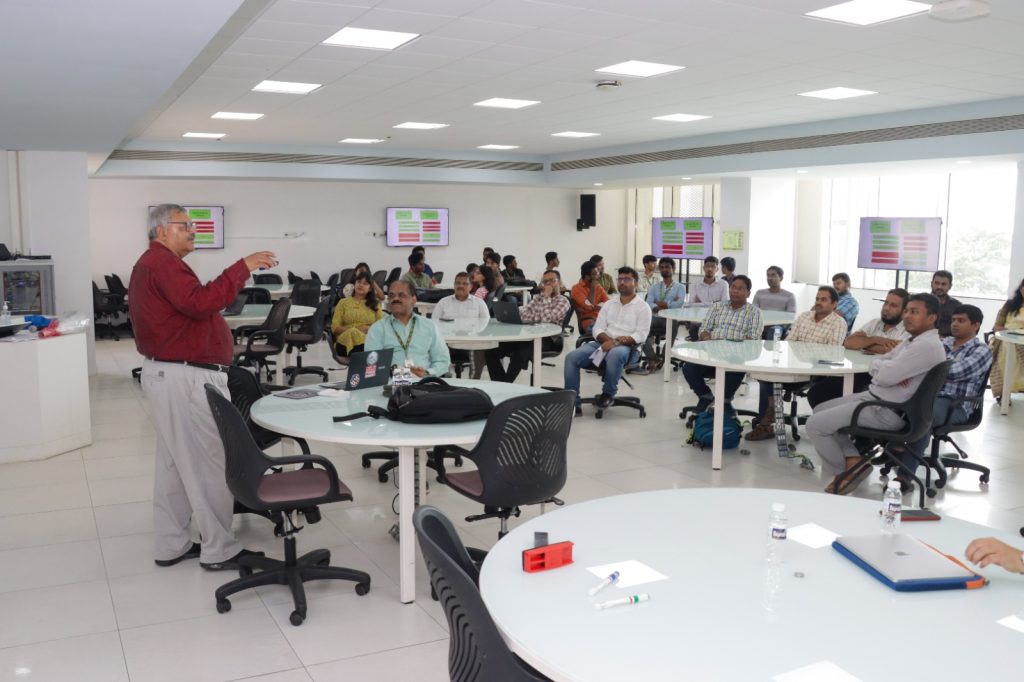
“If we start working today towards developing LTA systems, in 10 years India will lead the sustainable air transportation” esteemed academician, Prof. Rajkumar S Pant, Professor of Aerospace Engineering stated in his lecture at SRM University-AP. The seasoned expert from the prestigious institute of IIT Bombay delivered a lecture on “The Design and Development of Lighter Than Air Systems” at SRM university-AP on October 16, 2023, as part of the Distinguished Lecture Series 2023 organised by the Department of Mechanical Engineering. The lecture extensively discussed the latest developments in the area of conceptual design, sizing, design, development and flight/field testing of LTA Systems.
In his lecture, Prof. Pant encouraged students to explore the dynamics of Lighter Than Air Systems, beginning with aerostats and then gradually proceeding to more complex airships. The session highlighted the disaster of Hindenburg, breaking the myth that airship transportation is dangerous and unreliable. Prof. Pant engaged the session with video presentations on the building, developing and working of airships and aerostats that have been conducted at the Lighter-Than-Air Systems Laboratory of IIT Bombay. His lecture also showcased some of the research and development activities that have been carried out in the LTA Systems Laboratory of IIT Bombay including Project HERCARA, and other projects carried out in collaboration with ISRO and DRDO.
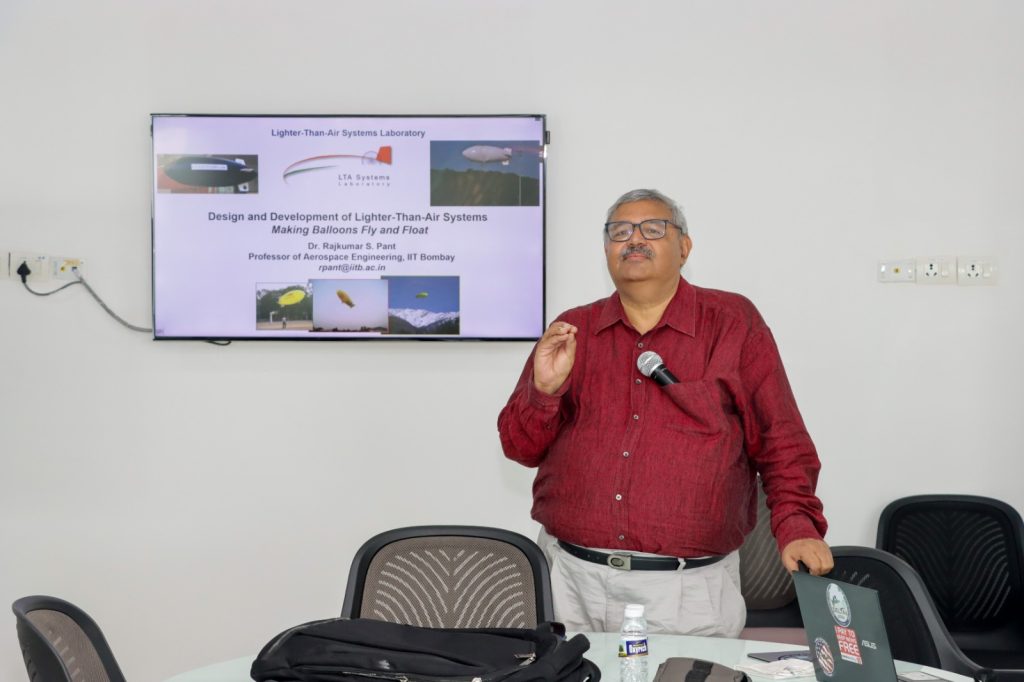
The distinguished lecture was followed by a workshop on “Sizing of Reusable Indoor Hot Air Balloon (RIHAB)”. The workshop provided the students with practical knowledge and hands-on experience on LTE systems and vehicles inducing research interest in the domain of aerospace engineering and sustainable air transportation. Prof. Ranjit Thapa, Dean – Research, Prof. Prakash Jadhav, Head – Department of Mechanical Engineering, faculty and students at the university actively participated in the lecture and the workshop.
- Published in Departmental News, Mechanical Engineering NEWS, News
ALOHA 2023: The Party of The Year Concludes With a Bang
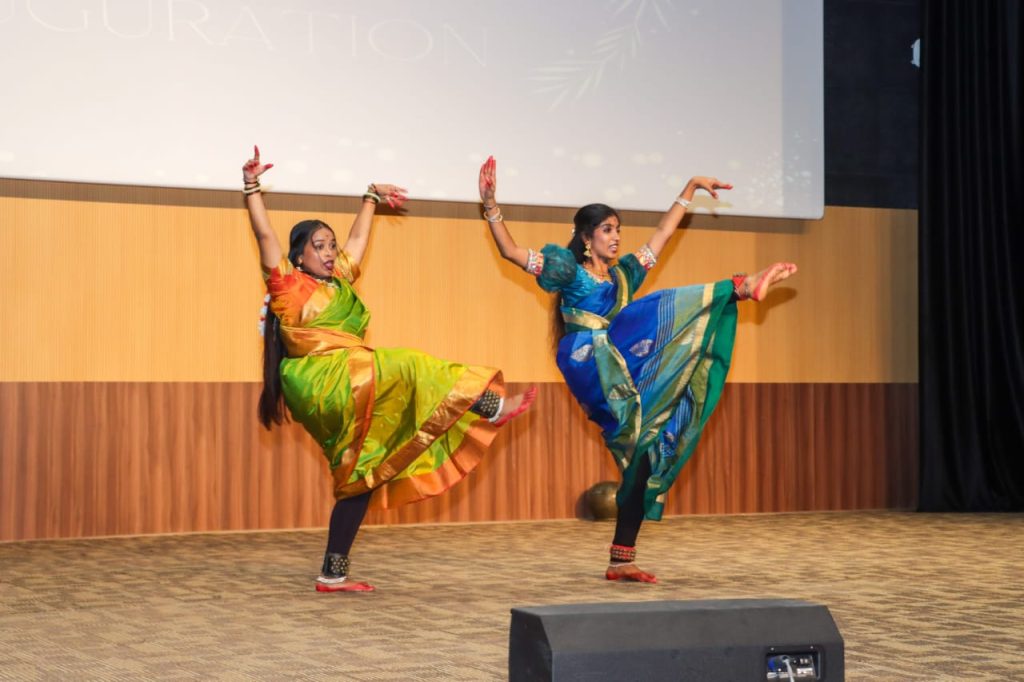
SRM University-AP successfully concludes its Freshers’ Party of the year, ALOHA 2023, with extravagance. The two-day freshers’ event was inaugurated by Vice Chancellor, Prof. Manoj K Arora on October 13, 2023, in the presence of Director of Student Affairs, Mr Anil Kumar Nigam, Asst. Director of Student Affairs, Ms Revathi Balakrishnan, Visiting Professor-Paari School of Business, Prof. Prabal K Sen, and the President and Vice President of the Student Council.
“The word ‘Aloha’ embodies compassion and kindness. We welcome you to your second home, SRM University-AP where we will nurture you to be holistic individuals throughout your academic journey” stated Prof. Arora in his inaugural address. The Director of Student Affairs welcomed the freshers into the academic and social community of the university. “SRM University-AP is a place for creating friendships, exploring your potential and being the best version of yourself!” Mr Nigam addressed the freshers.
ALOHA featured a Mr and Ms Freshers’ Contest that witnessed a spectacular display of talent by the students of SRM University-AP. Dhruv Narayan Bajaj and Vaishnavi Kasturi were crowned as the Mr and Ms Fresher of 2023, respectively. Various creative club activities and competitions from photography to dance and music, to anime quiz and cubing, and traditional games such as tug-of-war and Dahi Handi are some of the innumerable activities conducted as part of the freshers’ programme. The event successfully concluded with an exclusive DJ party featuring Project 91, Prithvi Sai and international artist DJ Pozitiva.
- Published in News, student affairs news, University Event
ICSSR Sanction for Research Project on PM Krishi Sinchai Yojana
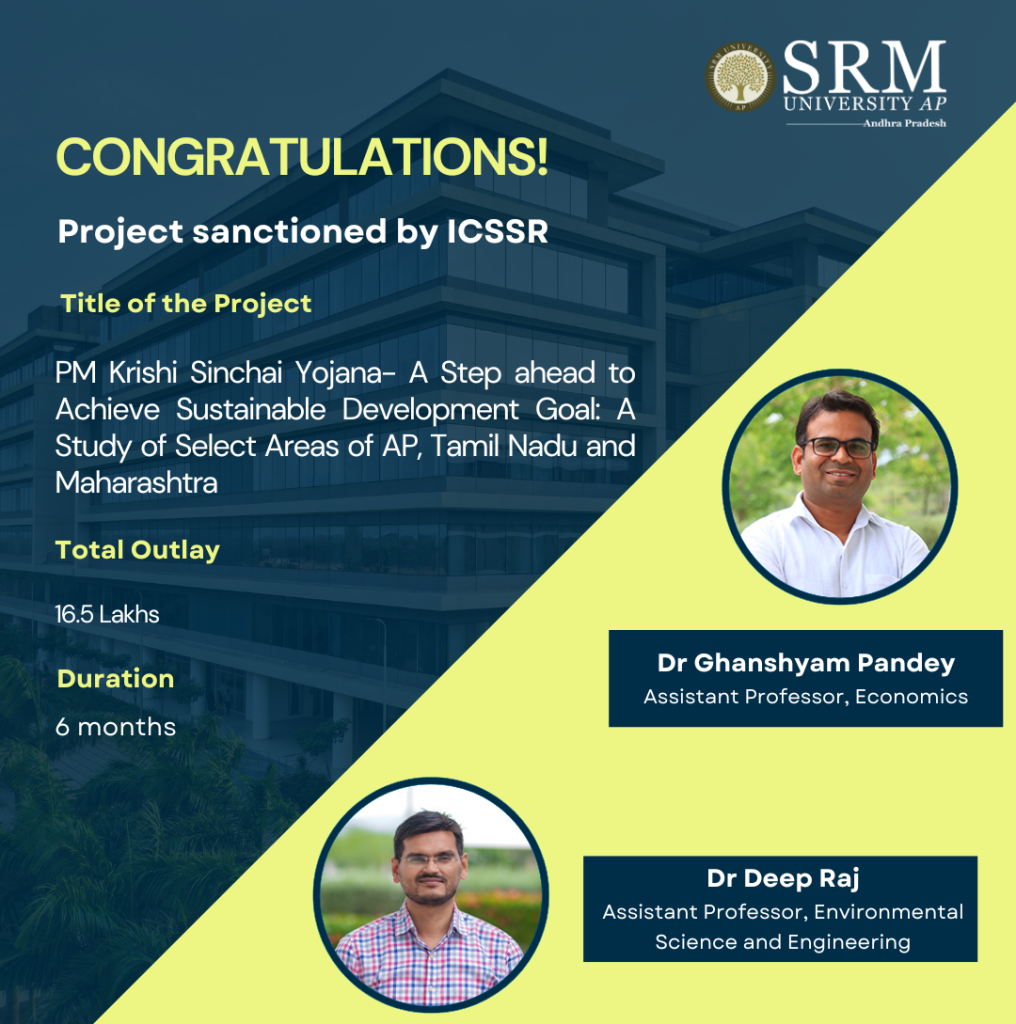
SRM University-AP takes pride in the achievements of its students and faculty. Dr Ghanshyam Pandey, Assistant Professor, Department of Economics and Dr Deep Raj, Assistant Professor, Department of Environmental Science and Engineering were sanctioned a project by the Indian Council of Social Science Research, New Delhi (ICSSR). The research project titled, “PM Krishi Sinchai Yojana- A Step Ahead to Achieve Sustainable Development Goal: A Study of Select Areas of AP, Tamil Nadu and Maharashtra” was sanctioned a total outlay of 16.5 Lakhs for a period of 6 months.
Abstract
Agriculture in India is dominated by smallholders. Yet only about 55% of India’s agricultural land is irrigated. The frequent occurrence of extreme climate events such as drought and heat are some of the main reasons for low agricultural productivity, food insecurity, and persistent poverty in developing nations. In this respect, irrigation plays a significant role in addressing climate change. However, irrigation costs are also very high for small-scale farmers because of their low incomes. Therefore, they do not have the resources to irrigate 100% of their land. In this context, PMKSY is a step towards resolving this problem in India and was introduced by the NDA government in 2015 by Har Khet Ko Pani. Therefore, the present study will examine the coverage, impact, adaptation and constraints of PMKSY in the Indian states of Andhra Pradesh, Tamil Nadu and Maharashtra.
Congratulations on this remarkable achievement!
- Published in Departmental News, Economics News, ENVS News, News, Research News
Faculty Duo Publish a Critical Analysis and Research on Cyberbullying
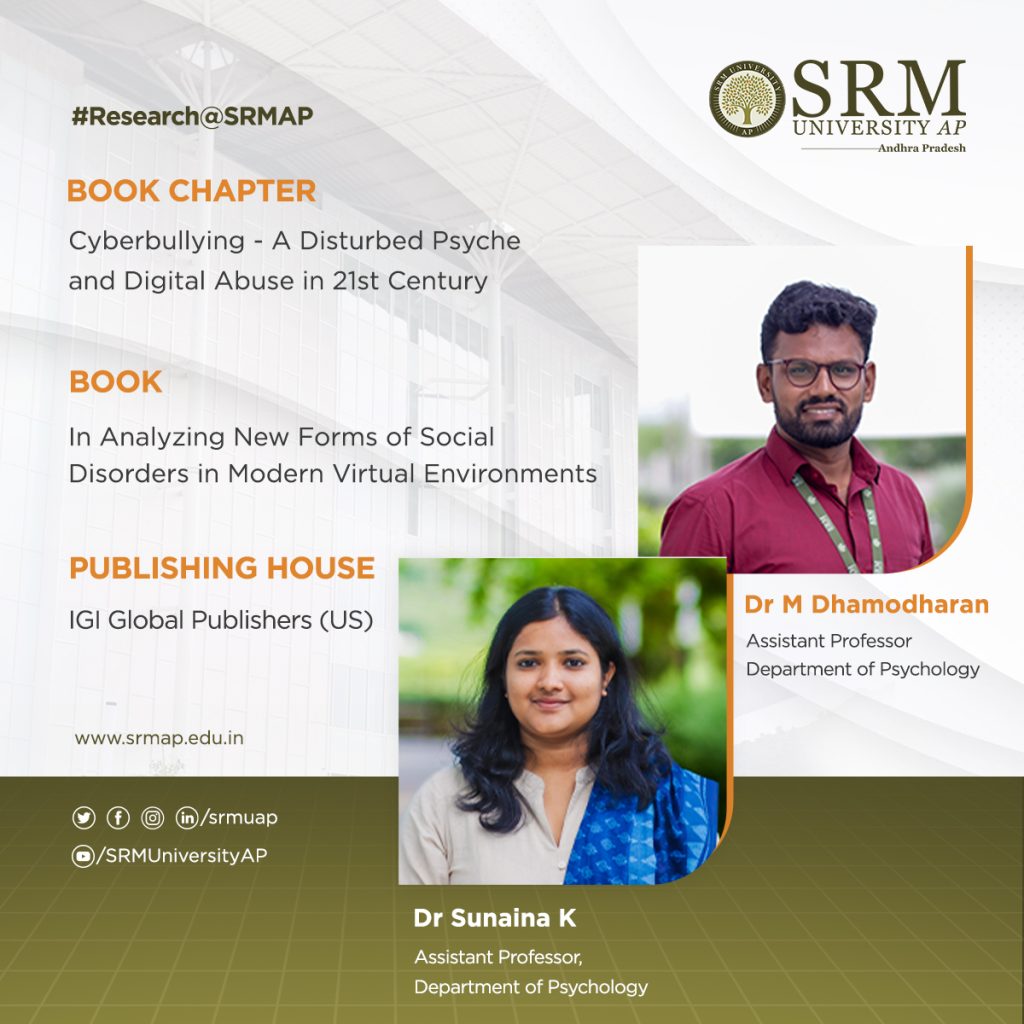
In the digital era, where technology dominates over communication, connection and social relationships, the staggering rise of cyberbullying proves to be detrimental to the social and mental psyche of people. The limited research present regarding the crisis fails to provide sufficient data to critically analyse and initiate policies to combat the same. In this regard, Dr Dhamodharan M and Dr Sunaina K, faculty from the Department of Psychology have conducted insightful research into cyberbullying, the role of technology and the challenges in tackling the act. The faculty duo has published a book chapter titled “Cyberbullying – A Disturbed Psyche and Digital Abuse in 21st Century” in the book In Analyzing New Forms of Social Disorders in Modern Virtual Environments in IGI Global Publishers (US).
Abstract
Cyberbullying is ‘a violent, planned act carried out by a group or specific, using electronic forms of communication, frequently and over time in contradiction of a victim who cannot easily protect him or herself.’ (Smith et al., 2008). According to the UNICEF and Broadband search survey 2023, around 36.5 out of a hundred people feel they were cyberbullied at least once in life, and seventeen percent of people experienced cyberbullying in the last month. 60 out of 100 adolescents experienced cyberbullying. Seventy percent of youths have reported perpetrators. Sixteen percent of women have been stalked at least once in life. 1 in 19 men have been stalked at some point. Fifty percent of LGBTQ people experience cyberbullying. Girls face cyberbullying more than boys. Around 36 percent of girls experience cyberbullying, whereas 24 percent of boys experience cyberbullying. Eighty-three percent of the victims who experienced online bullying also experienced physical bullying. Around 42 percent of the people experience cyberbullying on Instagram, followed by Facebook at 37%, Snapchat at 31%, WhatsApp at 12%, YouTube at 10%, and Twitter at 9%. Cyberbullying refers to using digital technologies such as cyberspace, societal broadcasting platforms, direct messaging, and email to bother, intimidate, or harm others.
This chapter provides an indication of cyberbullying, including its definition, incidence, and impact on individuals and society. Firstly, the chapter reviews the existing research on cyberbullying, exploring its different forms and characteristics and the psychological and social consequences for both victims and perpetrators. Secondly, the role of technology in facilitating and exacerbating cyberbullying is also examined, focusing on the anonymity and distance that online platforms provide. Thirdly, legal and ethical considerations surrounding cyberbullying including the challenges of enforcing laws and policies online are explored. Finally, the chapter highlights the importance of a comprehensive and collaborative approach involving parents, educators, policymakers, and online platforms to address cyberbullying.
Implications
Cyberbullying is a pervasive problem with significant and long-lasting consequences for people, their families, and society. It is essential to address cyberbullying thoroughly and implement effective prevention measures to create a more secure and respectful online environment. Cyberbullying can have detrimental effects on its victims, leading to feelings of helplessness, mental health issues, trouble with schoolwork, and even self-harm or suicide. In addition, cyberbullying affects the social fabric of groups, and trust, and impedes the proper growth of individuals, especially children and adolescents. Cyberbullying has a shocking prevalence worldwide, and it is spreading over to people silently. Traditional bullying differs from cyberbullying; it occurs to the victims in various forms and levels.
- Published in Departmental News, News, Psychology News, Research News


